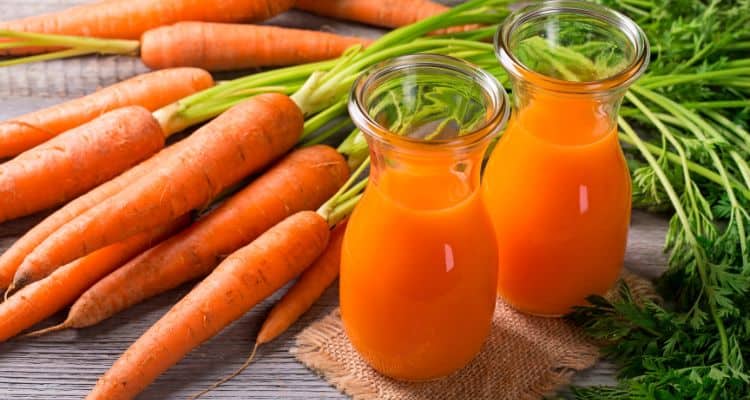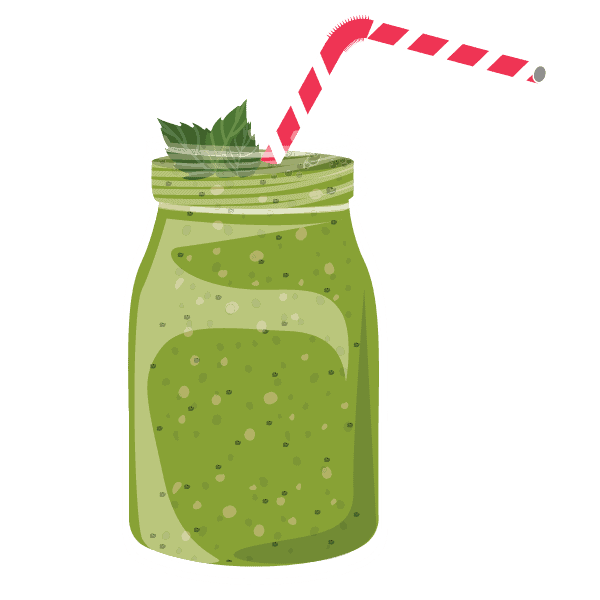Carrot juice is a popular health drink that provides numerous benefits to the body. It is an excellent source of vitamins, minerals, and antioxidants that aid in maintaining good health.
However, like any other food item, carrot juice will spoil if not stored properly or consumed within a certain timeframe. This article will explore how long does carrot juice last under different circumstances and how to store it properly.
The shelf life of carrot juice refers to the length of time that it remains safe to consume and retains its nutritional value. This depends on factors such as temperature, exposure to light and oxygen, and whether the juice is freshly made or store-bought. Knowing how long your homemade carrot juice lasts is crucial in ensuring you consume a healthy beverage.
Importance of knowing how long carrot juice lasts
Knowing how long your carrot juice lasts can prevent you from consuming spoiled or contaminated juice, leading to food poisoning or other health issues. Consuming expired or spoiled carrot juice can cause digestive problems such as bloating, gas, stomach cramps, and diarrhea.
Ideally, you want to drink freshly juiced carrot juice immediately after juicing. Carrot juice will start to decline within 24 hours, losing vital nutrients. Drinking fresh and healthy carrot juice ensures you get all the essential nutrients for optimal health.
How Long Does Fresh Carrot Juice Last?
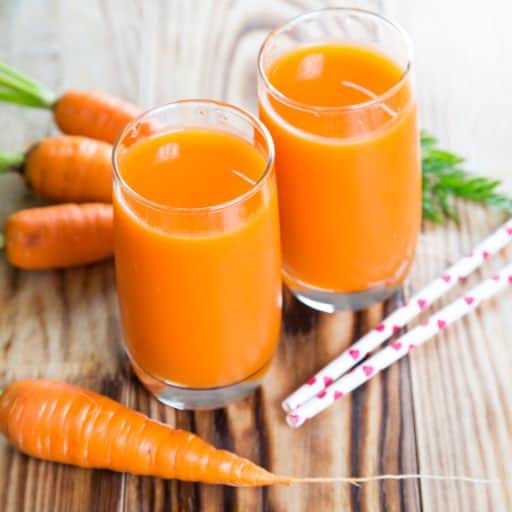
Carrot juice is a nutrient-rich and delicious drink that many people enjoy. However, like any other food or drink, it has a limited shelf life. The shelf life of carrot juice depends on several factors such as temperature, exposure to light, oxygen exposure, and whether the juice is freshly made or store-bought.
Factors affecting shelf life
Temperature is one of the critical factors affecting the shelf-life of carrot juice. When exposed to high temperatures for prolonged periods, enzymes in the juice begin to break down, leading to spoilage. Similarly, cold temperatures can slow down enzyme activity and increase the shelf life of your carrot juice.
Exposure to light is another factor that affects the shelf-life of carrot juice. Prolonged exposure to sunlight or artificial light may cause photooxidation reactions leading to off-flavors and odors in your carrot juice.
Oxygen exposure also plays a critical role in determining the shelf-life of your carrot juice. When exposed to air for long periods without proper storage techniques such as refrigeration or freezing, oxidation processes occur leading to spoilage.
Homemade Carrot Juice
The typical shelf-life of your freshly made carrot juice varies depending on storage conditions, such as temperature and oxygen exposure. Under optimal conditions, such as refrigeration at 34-40°F with no air exposure, freshly made carrot juice can last up to 5 days.
But not everyone can vacuum seal and chill their carrot juice, so the usual recommendation is to consume the juice within 3 days.
Over time, the juice will lose its nutritional potency, and the flavor can change due to oxidation. If you must store your carrot juice, store it in an airtight container in the refrigerator.
Store-bought carrot juices may have added preservatives that extend their shelf-life significantly more than freshly made juices. Depending on the brand and preservation methods used during processing and packaging, store-bought carrots juices typically last between 1 week – 2 months.
Signs that your carrot juice has gone bad
There are several signs to look out for to determine whether freshly made carrot juice is bad:
- Change in Color: Fresh carrot juice is typically bright orange. It may darken or have a brownish hue if it’s gone bad.
- Change in Smell: Fresh carrot juice should have a sweet, earthy smell. It may have a sour, unpleasant, or fermented odor if it has gone bad.
- Change in Taste: If the juice tastes sour or off, it’s likely gone bad. Fresh carrot juice should taste sweet and slightly earthy.
- Change in Texture: Fresh juice should be smooth. It has likely spoiled if it becomes thick, syrupy, or develops clumps or a film on the top.
- Mold or Fermentation: Visible mold or signs of fermentation, such as bubbles, indicate that the juice has spoiled and should not be consumed.
If you observe any of these signs, it’s best to discard the juice. Remember, it’s always better to err on the side of caution regarding food safety.
Storing Carrot Juice
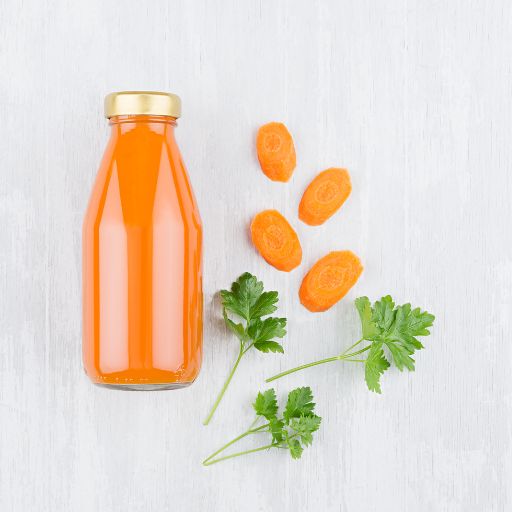
Refrigeration
The best way to store fresh carrot juice is in an airtight container in the fridge. Freshly made carrot juice should be consumed within a maximum of 72 hours. Refrigerate the juice as soon as possible after making it.
For nutrient retention, store it in the refrigerator for up to three days at a temperature range of 34°F to 40°F (1°C to 4°C).
It should be discarded if your fresh juice has spent more than 3-5 days in the fridge.
Freezing Carrot Juice
Freezing allows you to keep your carrot juice for up to six months without losing its taste and nutritional value. To freeze your carrot juice, pour it into an airtight container or freezer-safe bag, leaving some space at the top since the liquid expands when frozen.
Label and date each container before placing them in the freezer at a temperature range of 0°F (-18°C). Freeze for up to 3 months.
Note that after defrosting frozen carrot juice, there may be some separation or pulp settling at the bottom, which is normal.
Thawed carrot juice should always be consumed within two days; otherwise, it may deteriorate, affecting the quality of the juice.
Canning Carrot Juice
Canning is a great way to preserve carrot juice for up to a year. First, sanitize your jars and lids by boiling them in water. Then, heat the fresh or store-bought carrot juice in a saucepan but do not let it boil.
Ladle the hot juice into the sanitized jars, leaving about 1/2 inch of headspace. Wipe the rims of the jars with a clean cloth before sealing them with lids and rings, ensuring they are tight but not too tight.
Process the filled jars in a canner for 25 minutes for pint-sized jars and 30 minutes for quart-sized jars. Carrot juice can last up to a year on pantry shelves when canned properly.
Check for signs of spoilage before consuming canned carrot juice that’s been stored. Look out for cloudy liquid, bulging or leaking lids, or unusual odors or flavors.
Dehydrating Carrot Juice
Another way to preserve carrot juice is through dehydration. Start by pouring fresh carrot juice onto dehydrator trays lined with non-stick sheets or parchment paper.
Set the dehydrator temperature between 125-135 degrees Fahrenheit and let it run until all moisture has evaporated from the juice, which may take up to 24 hours.
Once fully dehydrated, break apart large chunks and grind them into powder using a food processor or blender. Store the powder in an air-tight container in a cool, dry place like your pantry or cupboard.
When properly dehydrated and stored in an air-tight container away from moisture and direct sunlight, powdered carrot juice can be stored for up to one year without spoiling.
Although it is best to drink carrot juice when fresh (ideally immediately after juicing), canning and dehydration offer excellent ways to extend its life without preservatives.
Frequently Asked Questions
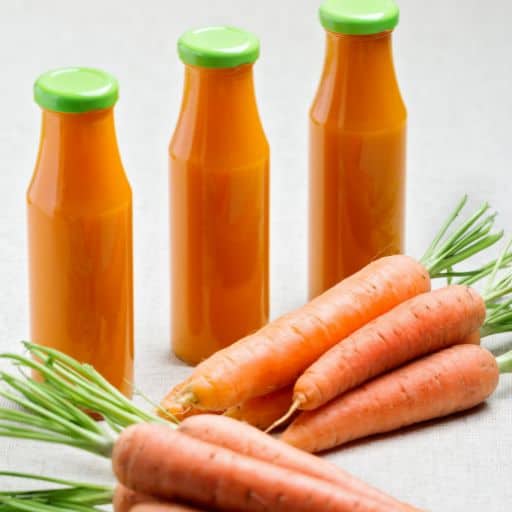
Does fresh carrot juice need to be refrigerated?
Fresh carrot juice should be refrigerated. Since it’s a perishable food item, it needs to be kept cold to slow down the growth of bacteria and preserve its freshness. Carrot juice left at room temperature for longer than 2 hours should be discarded.
Can I store fresh carrot juice at room temperature?
No, it’s not advisable to store fresh carrot juice at room temperature as it can quickly spoil due to the growth of bacteria. If you must store your freshly made juice at room temperature, drink it within 2 hours. After this time, throw it away.
Does adding lemon juice or other citrus juice to my fresh carrot juice help it last longer?
Adding a bit of lemon juice or other citrus juice to your fresh carrot juice can help to prolong its shelf life. The ascorbic acid in these juices acts as a natural preservative.
Conclusion
Understanding how long does carrot juice last is crucial for maintaining its quality and preventing food waste. Factors such as temperature, exposure to light, and oxygen can significantly impact the shelf life of carrot juice. Freshly made carrot juice typically has a shelf life of 1-3 days when refrigerated properly.
However, store-bought carrot juice might have a longer or shorter shelf life depending on the preservatives used and processing methods employed. Proper storage is vital for ensuring that your carrot juice stays fresh for an extended period.
Refrigeration is the most common method of storing fresh carrot juice, with a temperature range of 32°F to 40°F being ideal. Store-bought carrot juices usually come with instructions on how to store them once opened and unopened.
It’s also important to note that freezing can extend the shelf life of freshly made and premade carrot juices. While canned or dehydrated options are available, they require some preparation effort and are not commonly used methods for preserving carrot juice.
Proper storage practices can make a significant difference in the shelf life of your carrot juice while preserving its quality. By following these guidelines on storage best practices, you can enjoy fresh-tasting and nutrient-rich homemade carrot juices, and reduce food waste in your home.

